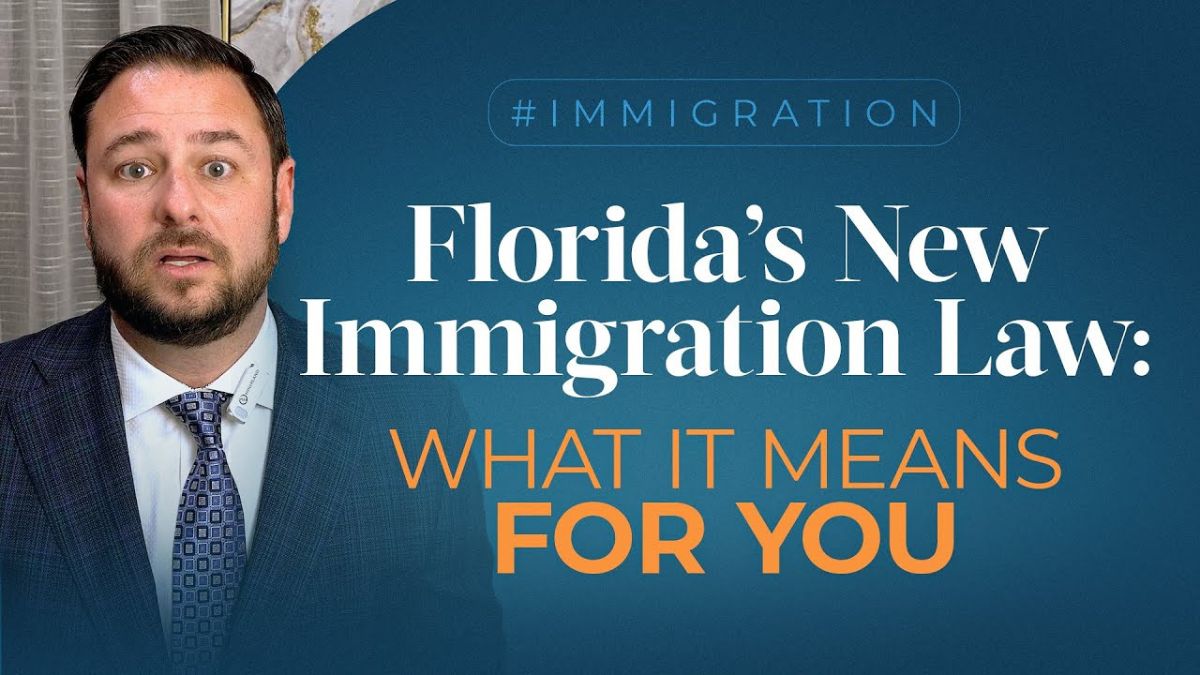A federal judge recently issued a preliminary injunction blocking key provisions of Florida’s controversial immigration law, SB 1718. This development has significant implications for employers across the state who have been grappling with new compliance requirements since the law took effect in July 2023.
The injunction represents a major shift in the legal landscape surrounding immigration enforcement at the state level. For businesses that have invested time and resources in adapting to the new requirements, this ruling brings both relief and uncertainty about what comes next.
Understanding the specifics of this injunction and its broader implications is crucial for Florida employers who want to maintain compliance while navigating an evolving regulatory environment.
Background on Florida’s SB 1718
Florida Governor Ron DeSantis signed SB 1718 into law in May 2023, creating some of the nation’s strictest immigration enforcement measures. The legislation targeted both individuals and businesses, introducing severe penalties for violations.
Key provisions of the original law included mandatory E-Verify requirements for businesses with 25 or more employees, enhanced penalties for transporting undocumented immigrants, and restrictions on the validity of out-of-state driver’s licenses issued to undocumented immigrants.
The law also required hospitals that accept Medicaid to collect information about patients’ immigration status and mandated that employers use E-Verify to confirm the work authorization of new hires. Violations could result in significant fines and potential loss of business licenses.
Details of the Federal Injunction
The preliminary injunction, issued by U.S. District Judge Roy Altman, specifically targets the E-Verify mandate for private employers. This provision required businesses with 25 or more employees to use the federal E-Verify system to confirm the work eligibility of all new hires.
Judge Altman found that the plaintiffs demonstrated a substantial likelihood of success in their constitutional challenge to this provision. The court cited concerns about federal preemption, arguing that immigration regulation falls primarily under federal jurisdiction.
The injunction does not block all aspects of SB 1718. Other provisions, including enhanced criminal penalties for human smuggling and restrictions on driver’s licenses, remain in effect while legal challenges continue.
Impact on Florida Employers
The injunction provides immediate relief for thousands of Florida businesses that were struggling to implement the E-Verify requirements. Many smaller companies with 25 or more employees had expressed concerns about the administrative burden and potential legal liability.
Employers who had already implemented E-Verify systems are not required to discontinue their use. The federal E-Verify program remains voluntary for most employers, and businesses can continue using it if they choose to do so.
However, the injunction creates uncertainty about long-term compliance strategies. Employers must now consider whether to maintain their E-Verify systems or return to previous hiring verification processes while the legal challenges play out in court.
Legal Challenges and Constitutional Questions
The injunction stems from a lawsuit filed by several advocacy groups, including the American Civil Liberties Union and the Southern Poverty Law Center. These organizations argued that SB 1718 violated federal preemption principles and constitutional protections.
Federal preemption doctrine holds that state laws cannot conflict with or interfere with federal regulatory schemes. Since immigration law is primarily a federal responsibility, states have limited authority to create their own enforcement mechanisms.
The plaintiffs also raised Equal Protection and Due Process concerns, arguing that the law would lead to discrimination against individuals based on their perceived immigration status or national origin.
What Employers Should Do Now
Florida employers should review their current hiring practices and compliance procedures in light of the injunction. Those who implemented E-Verify systems specifically to comply with SB 1718 may want to evaluate whether continued use aligns with their business needs.
It’s essential to maintain consistent documentation practices regardless of E-Verify usage. All employers must still comply with federal Form I-9 requirements, which mandate verification of work authorization for all employees.
Businesses should also stay informed about ongoing legal developments. The injunction is preliminary, meaning the underlying lawsuit is still pending. The final outcome could restore the E-Verify mandate or strike it down permanently.
Broader Implications for State Immigration Laws
The Florida injunction reflects broader tensions between state and federal immigration enforcement efforts. Several other states have enacted similar legislation, and the legal principles established in this case could influence challenges elsewhere.
Federal courts have historically been skeptical of state immigration laws that venture too far into areas of traditional federal control. The Arizona immigration law (SB 1070) faced similar constitutional challenges, with the Supreme Court striking down several key provisions in 2012.
This pattern suggests that state immigration laws must be carefully crafted to avoid conflicts with federal authority. Laws that focus on areas of traditional state responsibility, such as employment regulation or criminal enforcement, may have better chances of surviving legal challenges.
Looking Ahead: Next Steps in the Legal Process
The preliminary injunction is just the first step in what will likely be a lengthy legal process. The state of Florida is expected to appeal the decision to the U.S. Court of Appeals for the Eleventh Circuit.
Meanwhile, the underlying lawsuit will continue in federal district court. The plaintiffs must still prove their constitutional claims on the merits, while the state will defend the law’s validity and necessity.
The timeline for resolution remains unclear. Similar immigration cases have taken years to reach final resolution, particularly when they involve complex constitutional questions that may ultimately require Supreme Court review.
Preparing for Continued Uncertainty
Florida employers must prepare for continued uncertainty as the legal challenges unfold. This means developing flexible compliance strategies that can adapt to changing legal requirements.
Working with experienced employment counsel can help businesses navigate these complex issues while minimizing legal risk. Regular policy reviews and employee training programs can also help ensure consistent compliance regardless of regulatory changes.
The key is maintaining awareness of legal developments while focusing on core compliance obligations that remain constant regardless of state-specific requirements.









